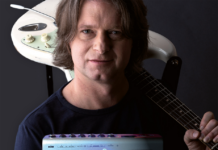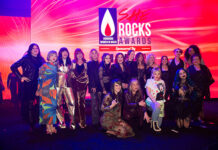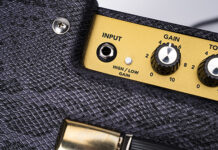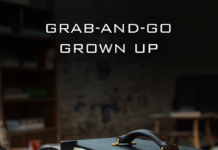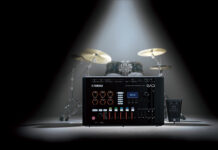Rise Against Hope Their New Album, 'Wolves,' Is a Call to Action
Since forming in 1999, Chicago-based punk-hardcore kings Rise Against have always worn their liberal/leftist views proudly on their sleeves.
Anybody expecting the band to go quietly into the night in the wake of 2016’s bitterly divisive presidential election has another thing coming. If anything, the aptly named group is more energized than ever and is hell-bent on leading by example through its music.
“I think that in this post-election America, there are a lot of people like us who are still trying to process the grief and shock they feel,” says guitarist-vocalist Tim McIlrath.
“It just doesn’t go away overnight. You wake up and see racism, sexism and xenophobia gaining momentum. We all thought these things were put in cages a long time ago, and now we realize they’re not. So we’re still processing that grief and trying to come to terms with it all.”
For a time, McIlrath toyed with the idea of titling the band’s blistering new album after the song “Mourning in America,” but something about the sentiment didn’t seem to fit the spirit they wanted to convey. “It felt pessimistic, even defeatist,” he notes. “So then I thought, Let’s activate our community of fans. Let’s help make them feel excited to be a part of a resistance, to be the wolves at the gate trying to take back control. Because that’s what we are, and it’s what we have to do.”
Guitarist Zach Blair concurs that the new album title, Wolves, more aptly describes the band’s collective mindset and serves as a mission statement for their legion of fans: “It’s us telling people, ‘Yes, this sucks. Every-body’s bummed, but there is something we can do.’ The pie-in-the-sky idea is to take back the government. Get pissed. Get in the streets. Civil disobedience. Let’s swing for the fences. Let’s be wolves.”
And indeed, McIlrath, Blair and their Rise Against bandmates (bassist Joe Principe and drummer Brendon Barnes) sound like they’re mad as hell, and they’re not gonna take it anymore on the 11 hard-charging tracks that comprise Wolves. Scheduling conflicts tied up longtime producer Bill Stevenson, so the group chose Nick Raskulinecz, known for his work with Rush, the Foo Fighters and Alice in Chains, to helm the new set at his Nashville studio.
In the past, the band’s guitar punch has sometimes taken a backseat to the considerable wallop of their message, but Raskulinecz recalibrates that balance, infusing tracks like “Far From Perfect” and “Parts Per Million” with stadium-sized sonic impact while opening up new avenues for tonal experimentation on songs such as “How Many Walls” and “Miracle.”
“Nick is super-nimble in the studio,” raves McIlrath. “He can dial up great guitar tones better than anybody. He knows what this amp does, what that mic does—there’s no guesswork. You just know you’re going to be in good hands with a guy like that.”
Let’s be honest: Some folks don’t want politics in their music. What do you say to people who just want fun music that rocks?
TIM MCILRATH Well, that’s not really what we’re all about. From day one, we’ve been the antithesis of the shut-up-and-play mentality. It’s the band that we started. It’s in our DNA. We have a message, and that’s what we’re here for.
The truth is, I get more excited to talk about politics than anything else. Politics got me interested in music. When I saw bands like Minor Threat and Rage Against the Machine, that was powerful music to me. I didn’t want to get on stage to live out some rock-star fantasy; I wanted to convey messages that I thought were important. And the world embraced us for who we are. We were never trying to be something we’re not. I’m still straight-edge and proud of it. I’m one of the dinosaurs.
ZACH BLAIR I remember after the election, some people said to us, “You just lost a fan.” And I was like, “Who did you think you were listening to in the first place?” With us, the music and the message always went hand-in-hand. Tim told me a long time ago, “We’ve got a microphone in front of our face.” There’s a responsibility that comes with that. You can say anything you want when you’ve got somebody’s ear. You can tell them to go party, or you can tell them to join a cool political organization. With us, it’s the latter. We’re not gonna shut up.
It’s interesting, Zach, that before Rise Against, you were in GWAR. That’s not exactly a political band.
BLAIR [laughs] No, they’re not. You know, I’m from Dallas, and I grew up on speed metal and thrash metal, and I’m a huge metalhead to this day. I was in a band called Hagfish, and as it turned out, Casey Orr, who’s Beefcake the Mighty in GWAR, was a fan of the band.
He needed a guitar player for GWAR, and he asked me to come try out. I thought it was a fun idea to audition, although I never thought I’d get the gig. And then I did get the gig! [laughs] It was fun, but I left after a while. I needed to follow my own heart and instincts. The guy who replaced me, Cory Smoot, was a fantastic guitar player. He passed away, so the band asked me to come back and help them write the record Battle Maximus. And it was great—I’m so glad I did it. It was so cool to reconnect with those guys. They’re still my best friends, and I love them all.
In the late Sixties and early Seventies, artists like Bob Dylan, Joan Baez, CSNY and Creedence Clearwater Revival had real impact with political songs. Do you think music matters in the same way to listeners nowadays?
MCILRATH I think it absolutely can, but it takes the right kind of music. When you’re engaged in music, it’s more powerful than anything else in your life. Those bands and artists set the tone in the Sixties and Seventies. They’re in the history books. You can read the analysis of the Vietnam War, but when you hear Bob Dylan singing “Masters of War” it becomes more real to you. For me, it was when I discovered Black Flag and Minor Threat—they made things real for me.
BLAIR I admit that it’s harder now. People’s attention spans are scattered. Just getting people to concentrate for a few minutes is so difficult. There are so many distractions. I’m guilty of it myself—I get anxiety over all the TV shows I want to watch. So yeah, getting people to listen to what you’re saying isn’t easy, but I think our fans are pretty sophisticated. They get it.
Do you guys ever disconnect from message music? Are there times when you just want to listen to music about girls and cars?
BLAIR I wouldn’t say I want to listen to current stuff like that. But one of my favorite bands is the Descendents, and all of their songs are about girls. On the other hand, I listened to a lot of the bands that inspired us politically—the Dead Kennedys, Bad Religion, bands like that. They really got my attention the most.
MCILRATH I don’t think every band should be political. I love the Ramones, but I don’t necessarily want to hear their political songs. If you have something political to say, that’s great; if not, you shouldn’t do it. Follow your heart and be who you are.
Where do you two meet guitar-wise? Who are the guitarists you both agree on, and are there players you don’t see eye-to-eye on at all?
BLAIR Tim and I always dance in and out of each other. You see what he’s playing and what I’m doing in the same song, and it’s like we’re in two different worlds. Interestingly, I was reading in Guitar World that Jerry Garcia and Bob Weir did the same thing in the Grateful Dead. Tim and I have that same thing.
We meet with the same classic punk-rock guys—Ian MacKaye, Stephen Egerton, Brian Baker. As for our differences, Tim is really into acoustic guitar music, and he’s really good at that. He’s very delicate, whereas I’m more ham-fisted. I just wanna play as hard and fast as I can.
MCILRATH I’d say Zach has more metal roots than I do, and I’ve got more punk roots. I grew up on Dischord bands. We meet right in this sort of aggressive, punky kind of thing. I’ll write songs that have lots of parts, but then I hand them to Zach because I know he can execute them. I gotta sing, so it’s hard for me to handle both things at once.
What more do you want to say about Nick Raskulinecz? Guitar-wise, did he push or challenge you in some new ways?
BLAIR Nick was great. He’s worked with so many amazing guitar players. I’m in the room talking with him about my playing, and I’m thinking, Wow, you’ve recorded Alex Lifeson. You’ve worked with Jerry Cantrell and the guys from the Foo Fighters. So that was really validating.
MCILRATH We loved working with him. He’s such a humble guy, but then you look at his résumé—the Foo Fighters, Alice in Chains, the Deftones, Rush… We would be talking about our favorite records, and he’d go, “I did that one,” just casually mentioning it. His experience and his depth of knowledge is pretty amazing.
BLAIR Working with Nick was pretty effortless, really. We became friends and had a great time. He’s very loose and fast. There were times when I played something and I felt like I could do better, but he would always say, “No, that was great. Let’s keep moving.” The looser approach that he took helped the overall creativity, I think.
“Wolves” has a big wall of rhythm guitars, but as you said, you generally don’t play the same things. Who’s doing what on that song?
MCILRATH That’s a big, dynamic sort of song. I wanted “Wolves” to start jangly, but when the song kicks in I wanted it to be in a drop D tuning. Whenever the guitar gets clean and jangly, that was me, and then Zach was handling a lot of the octave stuff as we’re kicking it. He does a lot of the lead-type things on there, too, all those little floating parts.
BLAIR We try to plot things out, and then once we have to play a song live we have to figure it out again. I’ll do a lot of sparkly little parts in “Wolves.” It kind of perks your ear up and gives the song a lot of flavor. You hear those parts dancing around the rhythm guitars.
There’s a pretty sweet, melodic solo in the song. Who’s playing that?
BLAIR That’s actually Tim. I’ll do it live, but he did it on the record. It usually comes down to figuring which ideas are the strongest. Tim has 10 ideas to my one. If it’s a standout guitar lead, something really flashy, I’ll usually take that for myself. But if it’s a melodic lead, something that enhances the song, Tim might take that.
“The Violence” has a lot of riffs and lines, but it doesn’t sound like a jumble. Is there an editing process to sort out the best ideas?
BLAIR That can happen—the jumble. You don’t want things to get too muddy, especially live. If there’s one big riff that has to stay consistent through the song, we’ll have one guy who’s on that and the other guy will do things on top. I do a lot of top-string layers. There are times when I’ll buddy up with Tim and we’ll play the same thing. That gives a riff or a part a lot of impact.
MCILRATH We try to boil ideas down to the really important ones. So you have to pick and choose—“What really makes a difference here?” Our goal is to make sure that your ear isn’t doing any work to hear the song. It should just come naturally to you.
“Mourning in America” is anthemic and rousing. There’s a bit of an early Who vibe to it—do you get that?
MCILRATH Oh, the Who… Yeah, I could see that. Joe wrote the music to that song, and we always felt it was almost like a Springsteen kind of vibe. He had a dirty Garage-Band kind of demo, but I was like, “That makes so much sense.” It sounded finished already. It had one of those big riffs that jumped out the second I heard it.
On “Politics of Love,” there’s a breakdown section with guitar embellishments, but no actual solo. A lot of guitarists would say, “Here’s my moment.”
BLAIR Yeah, I know. And that’s my inclination most of the time: Here’s a spot. I’m gonna play a big guitar solo. Why not? There’s been times, especially when Tim and I aren’t in the same room, where I’ve played a crazy guitar solo, and he’ll come in and say, “Dude, I was gonna sing there.” And I have to remember that people listen to the songs so they can sing along; they’re not listening for crazy guitar solos.
You two are pretty much Gibson guys all the way. Zach, you seem to like your Les Paul Classic Custom a lot.
BLAIR I do. On this record, I used two Classic Customs with Seymour Duncan JBs in them. They also have Evertune bridges. Tim and I decided to use the Evertunes. They’re important for guys like us who get recorded a lot live. At first it started as a studio thing so we don’t have to tune between takes, but now we have the bridges on all our guitars.
Tim, you’ve been playing a Gibson Les Paul Classic Custom, an SG Custom Reissue and a Gibson Wildwood Les Paul Custom. Did you use those on the record?
MCILRATH I used all those, absolutely. I used the Wildwood on a lot of it. And like Zach said, we have the Evertune bridges, which makes everything so much easier. I’m pretty much a Gibson-Marshall purest. I just want to play a Gibson into a Marshall.
Were a lot of pedals used in the studio?
BLAIR The Electro-Harmonix POG winds up on a lot of our stuff. I’m really into Ibanez Tube Screamers and an MXR Phase 90. I think, What would Eddie Van Halen use? We did use Fractal a bit because it’s nice not to have to set up mics, but most of the time I’m old-school.
MCILRATH The POG pedal was used on a couple of things here and there. And I think Nick had a whole repertoire of sounds that he had from doing some of the Deftones’ records.
You two use Marshall JCM900s live. Is that what you use in the studio?
BLAIR We used the reissue of the Jubilee head, but there was something else we used: Because Nick had produced the last two Rush records, he had one of Alex Lifeson’s Lerxst heads, that thing was amazing. I guess it’s modeled after one of Alex’s hot-rodded Jubilees. I used it on the whole record. We also used a Friedman Steve Stevens head—that sounded great. But I’ll tell you, that Lerxst was unbelievable.
MCILRATH That Lerxst was great. I’d never played it before, but I really liked it. I’m a Marshall guy, and that was the closest thing I heard that has the balls of a Marshall.
Zach, what’s the one thing Tim can do on the guitar that you just can’t?
BLAIR Tim is more intricate with how he plays. He can switch gears easily. If I’m going strong and the show’s happening, I’m balls out—playing as hard as I can. Tim can stop on a dime and switch moods instantly. I’ve always envied that about him.
And Tim, what can Zach do that you can’t?
MCILRATH My heart’s really not into guitar solos. I just don’t have the drive to do them, but Zach does. If we’re doing some super-blazing punk song and it needs a ripping solo, Zach is our go-to guy. I’m more into soundscapes. Zach calls that stuff my “sparkly chords.” If I see him playing a power chord, I’m thinking, What could I play higher up the neck that will complement what he’s doing?
Even though you’re both straight-edge, is there a rock side to you? What’s the most rock-star thing about you two?
MCILRATH [laughs] I don’t know… I’m such a bad rock star. None of us are prima donnas. We just played a show in Brooklyn and none of our gear arrived. Other bands might have canceled, but we said, “Hey, we’re a punk rock band, right? We should be able to borrow some gear and do this show.” And that’s exactly what we did. We’re good like that—we roll with the punches.
That’s not very rock star. Zach, what about you?
BLAIR [laughs] I don’t think it’s going to be interesting. Hmm… I’m a gear guy. I buy lots of Gibsons and Fenders and Marshalls. I guess that’s a rock star thing? I don’t have crazy demands about hotels and travel.
So you’re both cool with brown M&Ms?
BLAIR Sure. They taste better anyway. Bring ’em on!
Source: www.guitarworld.com

